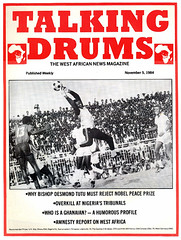Why Bishop Tutu must reject the Nobel Peace Prize Award
by Iniobong Udoidem
INIOBONG UDOIDEM of the Catholic University of America, Washington D. C., advances some interesting arguments about why Bishop Desmond Tutu must reject the Nobel Peace Prize recently awarded him. History, he argues, has demonstrated that there is danger in accepting such an award.The Bishop Desmond Tutu's Nobel Peace Prize Award has become an issue of international concern. The Nobel committee says it is of "vital importance" to Africa and claims that it is a "recognition of the courage and heroism shown by black South Africans in their use of peaceful methods in the struggle against apartheid." The Washington Post editorial (Oct. 17, 1984) says that "Never has the honor gone to a worthier person... the most widely accepted black critic of apartheid. This article raises the issue of the intent of the award and the security of Bishop Tutu and therefore calls on Bishop Tutu to reject the award.
If the assertion that Bishop Tutu is the most widely accepted black critic by the whole world, including the apartheid regime is true, then Bishop Tutu might not really be against apartheid but is making it, in his own words "more comfortable." One can therefore understand why the Nobel committee chose to reward him. On the other hand, if Bishop Tutu is really a true and consistent critic of apartheid, then the award might be an attempt to detract him from his focus. In which case, Bishop Tutu must be sensitive to his choice. In my opinion, he should reject the award as a demonstration of his rejection of apartheid in all its ramifications.
The claim of PEACEFUL methods in the STRUGGLE against apartheid seems to highlight the inherent contradiction in the intent of the Nobel Committee. PEACEFUL is defined as that which is characterized by calmness. and tranquillity, free from disturbance or disorder. STRUGGLE on the other hand is to contend or fight violently with an opponent or a series of violent efforts. If therefore the South Africans are struggling against apartheid, the talk of peaceful method is but hypocrisy.
As already anticipated by political observers, the award will have little or no significant effect on the political stance of the apartheid regime. On the other hand, it is certain that it will impoverish any effort on the part of Bishop Tutu to raise the consciousness of his people by a consistent effort.
The lessons of being a Peace Prize winner is not far-fetched. The last time such recognition was accorded a South African (the late Albert J. Luthuli in 1960), the result was constant harassment, imprisonment and subsequent obliteration. When Martin Luther King Jr. of the United States was awarded a Peace Prize for his non- violent activism he was rewarded with a violent assassination. With this history, why give Bishop Tutu a bad name to kill him?
It is true that the award will pitch Bishop Tutu into a political leadership role. But to whose advantage? Neither the apartheid regime will be able to contain him nor will Bishop Tutu be able to justify his non-violent stance any longer if he is to face the political realities of his people. Bishop Tutu himself has said that he is not so much "a political leader as a bearer of christian witness to what he regards as the evils of South Africa's segregationist system."
In my judgment, he will do better if he continues to witness with his people, raising their consciousness to the necessity of human dignity and freedom, than by becoming an ineffective international figure-head whose destiny is trapped in the cobwebs of rhetoric and international passivism.
If Bishop Tutu is to be consistent, he must reject the award. A self-made person needs no patronage otherwise his destiny will never be his own. A rejection of the award will be a much more demonstrative witness to his call for the freedom of South Africans. Such rejection will speak louder than the words that he would utter from the podium on the occasion of his acceptance speech.
He should reject the award because history has shown that black Peace Prize winners do not always live to achieve their goal. What's more, Bishop Tutu must realize that the Monetary Award is a crumb that has fallen from the spectre of interest that accrues from the Multi-national corporations whose patronage Bishop Tutu says has helped to perpetuate apartheid (Washington Post, Sept. 23, 1981).
Bishop Tutu must not be cajoled or tantalized to stooping to pick up the embroidered golden apple that is being dropped from the pinnacle of the tree that sheds the sun-light from reaching the shrubs at his father's court-yard. As long as the dignity of humanity continues to collapse in South Africa, and Africans are constantly segregated upon, harassed and denied their human rights, the race for peace remains to be won.
To award therefore a peace prize to a South African makes caricature of the essence of peace prize. "Prize" says the Webster's dictionary, "is something offered or given to the winner of a contest." A therefore is something that should be given to a peace winner. Bishop Tutu peace prize might have won the Nobel Prize but the struggle for peace continues.
